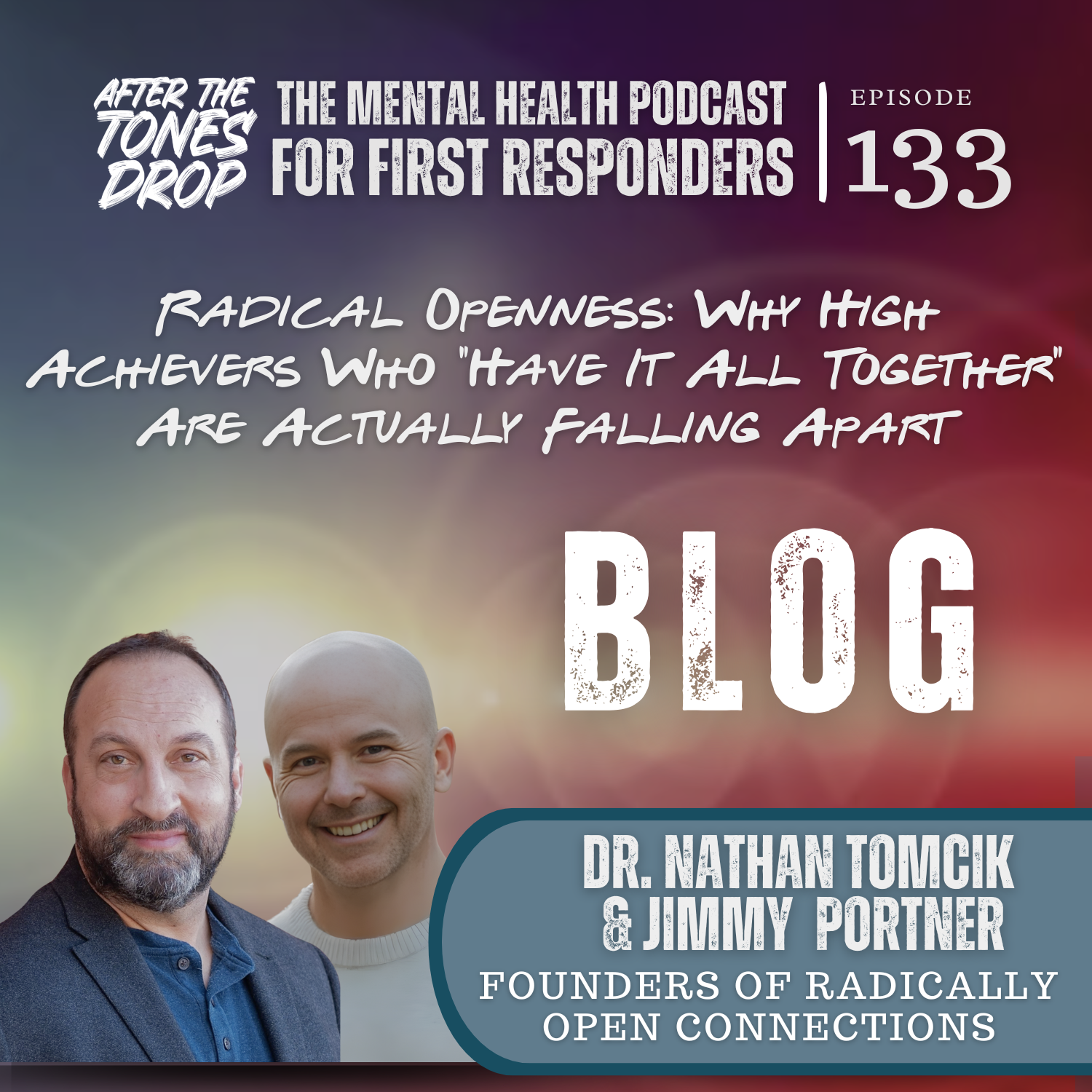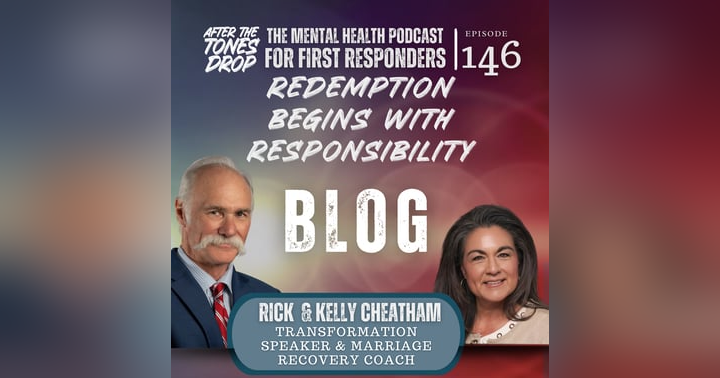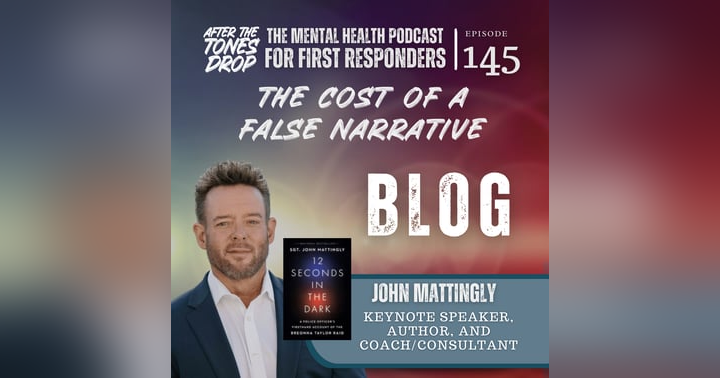Radical Openness: Why High Achievers Who "Have It All Together" Are Actually Falling Apart

Let me guess: You're the person everyone thinks has their life figured out. You show up on time, crush your goals, follow the rules, and keep your emotions locked down tighter than a evidence locker.
And you're miserable.
Maybe not dramatically, fall-apart-in-public miserable. Just... disconnected. Lonely. Going through the motions while wondering why success feels so hollow.
Here's the truth bomb: You don't need traditional therapy. You need Radically Open Dialectical Behavior Therapy (RO-DBT).
I sat down with Jimmy Portner and Dr. Nate Tomsick from Radically Open Connections, and this conversation fundamentally changed how I think about perfectionism, control, and why high-performers struggle in ways nobody talks about.
The Problem Nobody's Addressing
Traditional DBT—the therapy everyone's heard of—is designed for people who are emotionally reactive, impulsive, struggling to manage their feelings. That's under-control.
But what about the rest of us? The over-controlled ones?
We're the perfectionists. The rule-followers. The people who do ALL the homework, never miss a session, check every box... and still feel like something's fundamentally broken.
As Dr. Nate explained: "We had veterans who did all the homework, never missed a session, and still weren't getting better. They were suffering in silence."
Suffering in silence. That hit me hard. Because that's what over-control looks like from the outside—competence. And from the inside—isolation.
What Over-Control Actually Is (And Why It's Not Your Fault)
Over-control isn't a character flaw. It's a personality style that values self-discipline, reliability, and emotional restraint. These traits get rewarded—especially in fields like first responders, military, healthcare, law enforcement.
You're SUPPOSED to stay calm under pressure. You're SUPPOSED to control your emotions. You're SUPPOSED to be reliable.
Until those same traits that make you excellent at your job make you terrible at being human.
Over-control leads to:
- Chronic loneliness (even when surrounded by people)
- Emotional rigidity (you can't turn it off when you get home)
- Perfectionism that prevents connection (because vulnerability feels like failure)
- Depression and anxiety that nobody sees coming (because you look fine)
How RO-DBT Actually Works (The Stuff That Matters)
RO-DBT isn't about changing who you are. It's about adding flexibility to your toolkit so you can actually connect with people—including yourself.
Social Signaling: Your Face is Lying to People
Here's something wild: How you say something matters more than what you say. And if you're over-controlled, your face, tone, and body language are probably screaming "STAY AWAY" even when you desperately want connection.
The Big Three + One technique:
- Lean back (stop being so rigid)
- Take a slow, deep breath (calm your nervous system)
- Closed-mouth smile (signal friendliness)
- Eyebrow wag (universal sign of openness and safety)
Yes, an eyebrow wag. I know it sounds ridiculous. Do it anyway.
Practice this with low-stakes interactions—the cashier at the grocery store, the person at the coffee shop. Your brain needs to relearn that connection doesn't equal threat.
Radical Openness: Stop Defending, Start Learning
Over-controlled people are MASTERS at self-defense. Someone gives feedback? We explain it away. Someone criticizes us? We justify our position.
RO-DBT flips the script: "Is there something for me to learn here?"
This isn't about becoming a doormat. It's about curiosity over defensiveness. It's about being willing to be wrong, to not have all the answers, to admit you're struggling.
As Jimmy said: "Openness isn't about changing who you are. It's about being willing to learn from others and to be flexible in how you respond."
That's vulnerability with a backbone. That's strength.
Small Acts of Vulnerability (That Feel Massive)
You don't need to have a breakdown to connect with people. You just need to be honest.
Tell your partner you had a rough day. Admit to a coworker that you're overwhelmed. Ask for help with something small.
Dr. Nate shared a story about a veteran who, after years of emotional shutdown, started simply telling his wife when he needed a break after work. That's it. That one small change opened up conversations that rebuilt their entire relationship.
Connection doesn't require grand gestures. It requires truth.
Feedback is Your Friend (Even When It Sucks)
Here's an assignment that will make you uncomfortable: Ask someone you trust what you do that's annoying or keeps them at a distance.
Then shut up and listen.
Don't explain. Don't justify. Don't defend. Just listen.
Those blind spots? They're the very habits maintaining your disconnection. And you can't change what you can't see.
You Need a Tribe (Yes, Even You)
I know. Group therapy sounds like hell. Being vulnerable with strangers? Hard pass.
But RO-DBT skills classes provide something over-controlled people rarely experience: proof that you're not alone. That other high-achievers are also struggling. That competence and loneliness can coexist.
The sense of tribe matters. And many participants stay connected long after treatment ends—because finally, they found their people.
Why This Matters Right Now
If you're reading this and thinking "this sounds like me," you have two choices:
- Keep doing what you're doing (working harder, controlling more, wondering why nothing changes)
- Try something different
Information without action is just entertainment. So what are you going to do?
Resources That Actually Help
Radically Open Connections: radicallyopenconnections.com — Jimmy and Dr. Nate's practice (in-person and telehealth)
Radically Open.net: radicallyopen.net — Official RO-DBT site with therapist directory
Books Worth Reading:
- Radically Open Dialectical Behavior Therapy by Dr. Tom Lynch
- RO-DBT Skills Training Manual
- RO-DBT Self-Help Workbook by Dr. Lynch and Dr. Little
Final Thoughts (Because This Is Personal)
Radical openness isn't about losing control. It's about choosing flexibility over rigidity. Connection over isolation. Growth over staying stuck.
You've spent your whole life being competent. Maybe it's time to try being human.
The journey starts with one act of openness. One moment of vulnerability. One honest conversation.
You don't have to walk it alone. But you do have to take the first step.
Stop surviving. Start thriving.
Listen to the full conversation with Jimmy Portner and Dr. Nate Tomsick on After the Tones Drop.
https://www.afterthetonesdrop.co/ro-bdt
Real talk about over-control, perfectionism, and why the skills that made you successful might be keeping you lonely.



